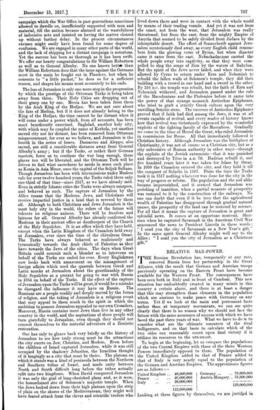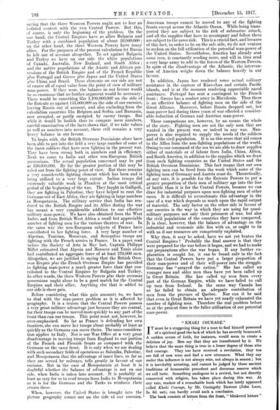RELATIVE MAN-POWER.
129,000,000 122,000,000
Looking at these figures by themselves, we are justified in
IFILE Russian Revolution has, temporarily at any rate, 1. removed Russia from her partnership in the Great . Alliance, with the result that German and Austrian troops previously operating on the Eastern Front have become available for the Yr estern Front. The consequences have been seen both in Italy and in front of Cambrai. This new situation has undoubtedly created in many minds in this country a certain alarm, and there is at least a danger that this may strengthen those elements in the population which are anxious to make peace with Germany on any - terms. Yet if we look at the main and permanent facts rather than at temporary movements, we can see quite clearly that there in no reason why we should not face the future with the same assurance of success with which we have faced the past three years of war. What we have to do is to consider what are the ultimate resources of the rival belligerents, and on that brads to calculate which of the two sides can reasonably count upon final victory if it utilizes its resources to the uttermost.
To begin at the beginning, let us compare the populations of the two Central Empires with these of the three Western Powers immediately opposed to them. The population of the United Kingdom added to that of France added to that of Italy is very nearly equal to the population of the German and Austrian Empires. The approximate figures are as follows :—
United Kingdom .. 46,000,000 Germany .. .. 78,000,000
France 40,000,000 Austria-Hungary.. 81,000,000
Italy .. 36,000,000 saying that the three Western Powers ought not to fear an isolated contest with the two Central Powers. But this, of course, is only the beginning of the problem. On the one hand, the Central Empires have as allies Bulgaria and Turkey with a combined population of about 26,000,000; on the other hand, the three Western Powers have many allies. For the purposes of the present calculation let Russia be left out of account altogether. To set against Bulgaria and Turkey we have on our side the white populations of Canada, Australia, New Zealand, and South Africa ; and the native populations of the Asiatic and African pos- sessions of the British Empire and of the French Republic plus Portugal and Greece phis Japan and the United States plus China and Brazil. These elements on our side are not of course all of equal value from the point of view of military man-power. If they were, the balance in our favour would be so enormous that no further argument would be necessary. There would be something like 1,100,000,000 on the side of the Entente as against 145,000,000 on the side of our enemies, leaving Russia out of account, and also excluding from the calculation countries like Belgium and Serbia and Rumania, now occupied, or partly occupied, by enemy troops. But while it would be foolish thus to compare mere numbers, careful examination of the facts shows that, if we take values as well as numbers into account, there still remains a very heavy balance in our favour.
To begin with, the British Overseas Dominions alone have been able to put into the field a very large number of some of the finest soldiers that have seen fighting in the present. war. i
They have been strong both in numbers and n efficiency. Next we come to India and other non-European British possessions. The actual population concerned may be put at 350,000,000. By far the greater portion of this may be ruled out from the fighting point of view. But there remains a very considerable fighting element which has been and is being utilized to a very large extent. Indian troops did extremely valuable work in Flanders at the most critical period of the beginning of the war. They fought in Gallipoli, they are fighting in Palestine, they have helped to rout the Germans out of East Africa, they are fighting in large numbers in Mesopotamia. The military service that India has ren- dered to the British Empire and its Allies during the war has meant a very considerable addition to our effective military man-power. We have also obtained from the West Indies and from British West Africa a small but appreciable number of fighting men for the various theatres of war. In the same way the non-European subjects of France have contributed to her fighting force. A very large number of Algerian, Tunisian, Moroccan, and Senegalese troops are fighting with the French armies in France. In a paper.read before the Society of Arts in May last, Captain Philippe Millet estimated that Algeria and Morocco and Tunis alone hod contributed an aggregate force of at least 270,000 men. Altogether, we are justified in saying that the British Over- seas Empire plus the French Overseas Empire has provided in fighting man-power a much greater force than that con- tributed to the Central Empires by Bulgaria and Turkey. In other words, the three Western Powers plus their overseas possessions ought alone to be a good match for the Central Empires and their allies. Anything else that is added to our side is sheer gain.
Before considering what this gain amounts to, we have to deal with the man-power problem as it is affected by geography. It is a truism that the Central Powers possess a very great military advantage just because they are central, for their troops can be moved more quickly to any part of the front than can our troops. This point must not, however, be over-emphasized. So far as France is defending her own frontiers, she can move her troops about probably at least as quickly as the Germans can move theirs. The same considera- tion applies to Italy. Nor is our War Office at a very great disadvantage in moving troops from England to our portion of the French and Flemish fronts as compared with the Germans on the same front. It is only when we are dealing with such secondary fields of operations as Salonika, Palestine, and Mesopotamia that the advantage of inner lines, so far as they are served by railways, tells greatly in favour of our
enemies. But in the case of Mesopotamia at least it is doubtful whether the balance of advantage is not on our
side, when India is taken • into account.. It is probably at least as easy for us to send troops from India to Mesopotamia as it is for the Germans and the Turks to reinforce their armies there.
When, however, the United States is brought into the picture geography comes out on- the side of our enemies. American troops cannot be moved to any of the fighting fronts except across the Atlantic Ocean. While being trans- ported they are subject to the risk of submarine attack, and all the supplies that have to accompany and follow them are subject to the same risk. This is a crucial fact, and because of this fact, in order to be on the safe side, we do not venture to reckon on the full utilization of the potential man-power of the United States. Nevertheless, America has already sent some men, is constantly sending more, and will in time send a very large army to add to the forces of the Western Powers. In spite of the disadvantage of the Atlantic, the interven- tion of America weighs down the balance heavily in our favour.
In addition, Japan has rendered some actual military assistance in the capture of Kiao-chau and certain Pacific islands, and is at the moment rendering appreciable naval assistance. Portugal has sent a contingent to the French front ; Greece has a modest army in Macedonia. Thus there is an effective balance of fighting men on the side of the Great Alliance. Moreover, before Russia dropped out., her man-power had during three years of war effected a consider- able reduction of German and Austrian man-power.
These comparisons are, however, by no means the whole of the story. Fighting men are not the only men that are wanted in the present war, or indeed in any war. Man- power is also required to supply the needs of the soldiers and of the civil population. It is on this score that aid comes to the Allies from the non-fighting populations of the world. Owing to our command of the sea we are able to draw supplies either of materials or of labour from India, China, Africa, and South America, in addition to the supplies which we draw from such fighting countries as the United States and the British Overseas Dominions. This fact means that our own fighting men can be freed from the work which some of the fighting men of Germany and Austria must do. Theoretically, at any rate, it is possible for the Entente Powers to put a greater proportion of their men of military age into the line of battle than it is for the Central Powers, because we can draw for industrial purposes upon non-fighting men of other races. It is difficult to overestimate this advantage in the case of a war which depends so much upon the rapid output of material. The only factor on the other side in favour of our enemies is the way in which they are using for quasi- military purposes not only their prisoners of war, but also the civil populations of the countries they have conquered. It is clear, however, that the balance of advantage on the industrial and economic side lies with us, or ought to lie with us if our resources are competently exploited.
Why then, it may be asked, have we not yet beaten the Central Empires ? Probably the final answer is that they were prepared for the war before it began, and we had to make our preparations after the war began. If any further ex- planation is sought for, it can be found only in the fact that the Central Powers have put a larger proportion of their man-power and of their will-power into the struggle. Germany has "arrayed the nation.' She has called up younger men and older men than have yet been called up in Great Britain. She has called up men from every part of the German Empire, while we have failed to call up men from Ireland. In the same way Canada has so far failed to obtain an adequate contribution of men from the provnce of Quebec. Nor can it be said that even in Great Britain we have yet nearly exhausted the number of fighting men. Therefore the real problem before us at the present tune is the fuller utilization of our potential man-power.



































 Previous page
Previous page